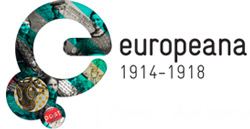
The following News Release is from the British Library:
Europeana 1914-1918: A new website that brings all sides of World War One together launches in Berlin, featuring 10,000 items from the British Library’s collections
www.europeana1914-1918.euThe Federal Government Commissioner for Culture and Media in Germany, Monika Grütters, today launched Europeana 1914-1918, an online resource that opens up hidden stories of the First World War and shows the tragedy that shaped Europe from different sides of the conflict.
Europeana 1914-1918 is the most important pan-European collection of original First World War source material. It is the result of three years of work by 20 European countries and will include:
- 400,000 rare documents digitised by 10 state libraries in Europe
- 660 hours of unique film material digitised by audiovisual archives
- the personal papers and memorabilia of some 8,000 people involved in the war, held by their families and digitised at special events in 12 countries
The British Library is leading the UK’s contribution to the site, and has contributed 10,000 items from its own First World War collections to the site, including trench journals from foreign troops, iconic war poetry, London schoolchildren’s accounts of Zeppelin raids and many more. The British Library has also produced a new website offering curated access to over 500 digitised historical sources from Europeana 1914-1918 for schools.
The new educational website [www.bl.uk/world-war-one], funded by the European Commission and developed by the learning team at the British Library in London, gives curated access to content digitised as part of Europeana 1914-1918 in a number of languages. The site provides teaching materials for schools, and is designed to help students and anyone wanting to learn about the war to explore the events around 1914-1918.
Alongside the original documents and images, the site includes short films, essays and interviews with leading experts from countries across Europe on topics that defined the war and its aftermath. They include
- the shifting boundaries of Europe
- how technology drove the war
- the power of propaganda
- the class and gender struggles that emerged from WW1 to transform Europe
At the launch, the Federal Government Commissioner for Culture and Media, said, ‘Europeana 1914-1918 will help us understand the crisis that convulsed Europe. It opens up unfamiliar stories to the world that will inform our reflections on the tragedy during the centenary years. This site documents Europe’s shared experience and gives us the resources to see the conflict from many different perspectives.’
Monika Grütters continued, ‘Among the numerous projects the Federal Government of Germany is initiating and financially supporting during the current Centenary 2014, Europeana 1914-1918 is a highlight due to its pan-European dimension. It shows the stark difference between the European disruptions of that time and our way of cooperating nowadays. It is vital for the Government to point out, especially to young people, that today’s Europe is a union based on shared values, policies and justice. That’s the best way to avoid the wars, terror and fragmentation that Europe suffered in the 20th century. We don’t just want to show historical events, we want to use them for the present and the future. The Europeana project will help shape our views of that time and it will make a great contribution to the mutual understanding of the European people, despite the conflicts of history.’
Europeana 1914-1918 is full of original source material – digitised photographs, maps, diaries, newspapers, letters, drawings and other content that can be used by teachers, historians, journalists, students and interest groups to create new resources. Already, the site is providing content for a new exhibition called The First World War: Places of transition as well as the new educational site developed by the British Library in London.
Jill Cousins, Executive Director of Europeana, said,
‘It’s a unique collection of raw materials – rare, fragile and hardly seen before. We’re encouraging everyone – history teachers, Wikipedians, apps developers – to use it in new ways. Most of the content is under an open licence, because we want people to re-use it to help broaden everyone’s understanding of our European past.’